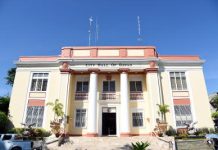
Thirty cases of hand, foot and mouth disease (HFMD) were recorded inside Ateneo de Davao University – Preschool and Grade School (ADDU-PGS), affecting day care and elementary students, the City Health Office (CHO) reported on Thursday.
Based on CHO’s investigation, these cases were distributed among 16 classrooms, with “one to two cases” per classroom, said Dr. Tomas Miguel Ababon, CHO head, during a press conference at the City Hall.
Ababon said the cases were cumulative in nature, starting from just one case, which was recorded on October 3 in a certain elementary classroom, then would add up one case at a time per day, until it affected 16 classroom sections.
This was raised after the Ateneo de Davao University – Preschool and Grade School (ADDU-PGS) department said it would shift its classes to online learning (synchronous and asynchronous) classes from pre-school to grade six students, to minimize exposure from HFMD on Wednesday.
“We only learned about this disease [happening in the school] from the parents of the students,” Ababon said.
He said the school declined to give the students’ identities, but confirmed that those affected were students.
“So far these are mild cases, with no complications. If the cases will dramatically go high, that’s when we will recalibrate on our response,” Ababon said.
When asked if this should be a cause for concern and if the disease might not be exclusive to ADDU-PGS, Ababon said, “I cannot say that, because there are districts who are reporting these recordable cases.”
Ababon said schools are also being reminded to report their set of findings to CHO if such viral or communicable diseases like HFMD were recorded within their areas.
Despite this, Ababon said there is actually a decrease of its tallied cases throughout the city – with 191 recorded cases from January 1 to October 12 this year compared to 479 cases in the same period last year.
HFMD, as defined by the World Health Organization, is a viral and transmissible disease that can infect infants and children under five years old.
In most cases, the disease is mild and self-limiting, with common symptoms including fever, painful sores in the mouth, and a rash with blisters on hands, feet and buttocks.
Ababon said there is no cause for panic, nor is there an outbreak, emphasizing that this disease is “mild in nature.”
The CHO head urged parents and students to wash their hands frequently and refrain from going to school if experiencing symptoms.
Ababon said he urged establishments and schools to disinfect places where children usually visit and play, like classrooms and playgrounds. (Ian Carl Espinosa / MindaNews)






